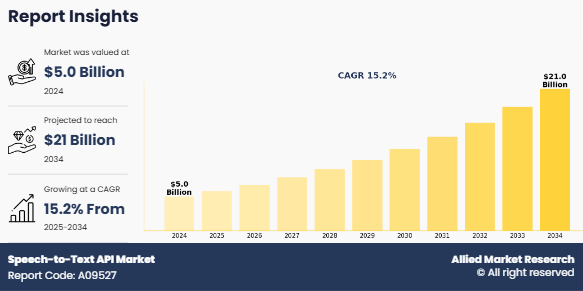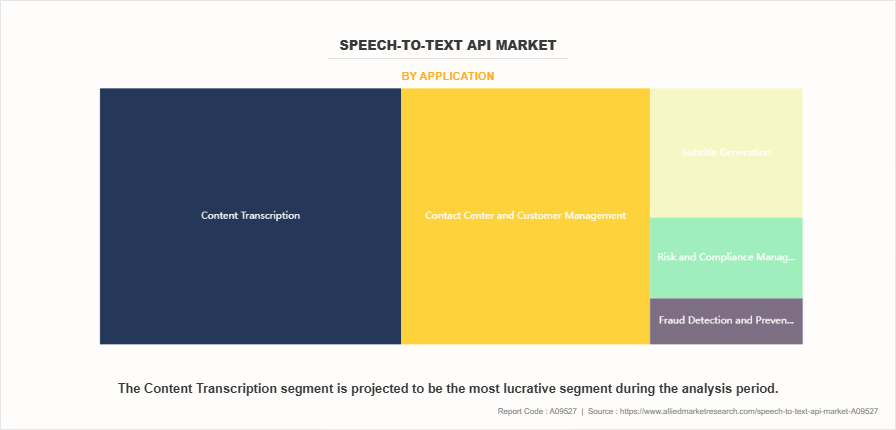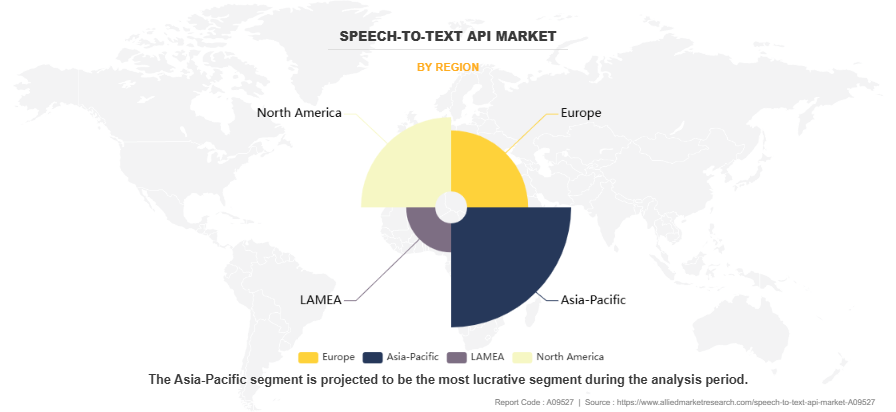Speech-to-Text API Market Overview
The global speech-to-text API market was valued at USD 5 billion in 2024, and is projected to reach USD 21 billion by 2034, growing at a CAGR of 15.2% from 2025 to 2034.
Factors such as the rise in demand of AI in speech-to-text technology drives the growth of speech-to-text API market size. Advancements in speech recognition technology have enabled businesses to develop voice-enabled interfaces that match consumer expectations due to significant advancements in natural language processing (NLP) and speech quality. In addition, rise in need for voice-based devices for better and faster experience boosts market growth. Thus, these factors drive the growth of the speech-to-text API market. However,challenges such as transcribing audio from multichannel sources and limited multilingual support for captioning and subtitling hinder the growth of the speech-to-text API industry. On the contrary, innovation in speech-to-text solutions for disabled students is expected to provide major lucrative opportunities for growth of the speech-to-text API market.

Introduction
A speech-to-text application programming interface (API) is simply the ability to call a service to transcribe audio into speech. The STT service receives the audio file, processes it using either machine learning or a set of tools that combine machine learning with rule-based approaches. Speech-to-text technology works on a variety of devices, including smartphones, tablets, and computers. The governments across the globe are encouraging the use of speech-to-text technology in education. For instance, the Individuals with Disabilities Education Act (IDEA) provides interactive software in the classroom for deaf students. In addition, in May 2022, a Northern Illinois University professor created an interactive software lecture using speech-to-text API technology to help students learn Nemeth code.
Key Takeaways:
By Component, the software segment held the largest speech-to-text API market share in 2024.
By Enterprise Size, the Large Enterprise segment held the largest share in the speech-to-text API market for 2024.
By Application, the content transcription segment held the largest share in the speech-to-text API market for 2024.
By Industry Vertical, the retail and e-commerce segment held the largest share in the speech-to-text API market for 2024.
Region-wise, Asia-Pacific held largest market share in 2024. However, LAMEA is expected to witness the highest CAGR during the forecast period.
Segment Review
The speech-to-text API market is segmented into component, enterprise size, application, industry vertical, and region. By component, it is bifurcated into life software and services. By enterprise size, it is classified into large enterprise and SMEs . By application, it is divided into contact center and customer management, content transcription, fraud detection & prevention, risk & compliance management, subtitle generation, and others. By industry vertical, it is classified into BFSI, IT & telecom, healthcare, retail & e-commerce, media & entertainment, education, government & defense, and others. By region, it is analyzed across North America, Europe, Asia-Pacific, and LAMEA.

On the basis of application, the content transcription segment held the largest market share in 2024 driven by its indispensable role in converting spoken language into structured, searchable text across industries. This segment leads due to surging in its demand in healthcare for clinical documentation in legal and media sectors for accurate record-keeping and in corporate environments for meeting transcriptions and compliance reporting. However, the fraud detection and prevention segment is expected to grow at the highest rate during the forecast period, owing to increase in adoption of voice biometrics and AI-powered speech analytics to combat financial fraud and identity theft. As cybercriminals use more sophisticated social engineering tactics such as deepfake voice scams and vishing (voice phishing), enterprises across banking, fintech, and e-commerce are prioritizing real-time voice authentication and anomaly detection in call centers.

On the basis of region, Asia-Pacific dominated the market share in 2024, fueled by a unique convergence of technological, economic, and demographic factors. This remarkable growth stems from the region's rapid embrace of digital transformation across both enterprise and consumer sectors, particularly in developing economies such as India, China, and Southeast Asia, where rise in mobile-first population drives the demand for voice-enabled solutions. However, LAMEA region is expected to grow at the highest rate during the forecast period, owing to a combination of technological leapfrogging, rapid digitalization, and unique regional needs. This accelerated growth stems from increase in smartphone penetration and mobile internet adoption across emerging economies, coupled with surge in demand for localized voice solutions in Arabic, Portuguese, and African languages.
Top Impacting Factors
Driver
Rising need for voice-based devices
The need for smart devices, such as smart speakers and mobile phones, has been increasing over the last decade, which has resulted in a growing demand for making online video content accessible for every individual amidst the surge in technological adoption and massive proliferation of internet-based content. This trend has significantly contributed to the rise in speech-to-text API market demand, as several new advanced devices are introduced with voice-controlled features. These features include voice processing capabilities such as content transcription and conference call analysis, enabling users to access educational, entertainment, and other content through their smart devices.
Hence, speech-to-text applications have increased due to the surge in need for understanding customer preferences. Moreover, there is increase in demand for smart homes and smart appliances owing tof actors such as surge in internet penetration, advancements in technology, and increase in awareness about automation. The rapid proliferation of smart devices and voice-enabled technologies across industries is significantly driving demand for speech-to-text APIs in the market. In addition, businesses are increasingly adopting AI-powered voice solutions for customer service, virtual assistants, and workflow automation to enhance productivity. Moreover, enterprises across healthcare, finance, and technology sectors are particularly investing in advanced speech-to-text APIs to enable real-time transcription, multilingual support, and seamless integration with business applications.
Advancements in speech recognition technology have enabled businesses to develop voice-enabled interfaces that match consumer expectations due to significant advancements in natural language processing (NLP) and speech quality. Moreover, continuous enhancements in Al, cloud computing, and information technology have empowered innovations such as voice-to-text progress at a remarkable pace, which contribute to augment the speech-to-text API market growth.
In addition, advanced technologies, such as artificial intelligence and machine learning, enable conversational devices to accurately perceive speech, which improves the system's capacity for self-learning. Furthermore, Al-based speech and voice recognition systems are expected to automatically capture the complete agent-customer interaction to provide hidden feedback and opportunities. Therefore, this is a major factor propelling the growth of the speech-to-text API market size.
Restraints
Multilingual support for captioning and subtitling
Language differentiation across the globe is a major concern for content creatorsi n producing accurate transcripts and subtitles for every language. Implementing speech-to-text API solutions becomes particularly difficult in countries with numerous regional and local languages.
As consumers and enterprises located across different parts of a country speak a variety of local languages, approaching them with a generic solution is not expected toa dd any value to their business and would not lead to the successful penetration of speech-to-text API solutions. Moreover, solutions must be different in terms of functionality and platform from mainstream mobility solutions.
In addition, several speech-to-text API solution providers are making efforts to ensure users who speak a single language andd o not speak other languages apart from their local dialect are expected to get an opportunity to access speech-to-text features on their smartphones as well huge benefits are achieved by designing speech-to-text API solutions for micro-linguistics and local languages.
Opportunity
Innovation in speech-to-text solutions for disabled students
Innovation in speech-to-text solutions is revolutionizing education for disabled students, especially those with hearing, motor, or learning impairments. Modern tools now leverage AI and natural language processing to offer real-time, highly accurate transcription, enabling students to follow lectures, participate in discussions, and complete assignments independently. Voice recognition systems are customized to individual speech patterns, including those with speech difficulties, ensuring inclusivity. Integration with classroom technologies, such as smartboards and learning management systems, further enhances accessibility. Mobile-friendly apps and cloud-based storage ensure notes are available anytime, supporting continuous learning. Some advanced solutions even provide multi-language support and visual cues, bridging communication gaps for students with additional needs.
These innovations are not only empowering students academically but also fostering confidence, independence, and social inclusion. As technology continues to evolve, speech-to-text tools are expected to play a vital role in making education more equitable and responsive to diverse learning needs, a trend also reflected in the growing speech-to-text API market forecast, which highlights increasing demand for scalable, accessible transcription solutions across sectors including education.
Competition Analysis
The report analyzes the profiles of key players operating in the speech-to-text API market are Amazon Web Services, Inc., IBM Corporation, Google LLC, VoiceCloud, Descript, Rev.com, Microsoft, Voicebase, Inc., Amberscript Global B.V., Speechmatics, Verbit.ai, Sonix.ai, TurboScribe, Otter.ai, Apple, Inc., WhisperAPI.com, Deepgram Inc., AssemblyAI, Inc., Twilio Inc., and Trint. These players have adopted various strategies to increase their market penetration and strengthen their position in the speech-to-text API industry.
Recent Developments in the Speech-to-text API Market
In October 2023, Descript launched its range of exciting new AI features designed to enhance audio and video editing workflows. These updates include new AI voices, AI Actions, and several other tools aimed at making the editing process more intuitive and efficient. The new features are integrated directly into Descript's platform, allowing users to streamline their creative processes and produce high-quality content more easily.
In January 2025, Trint partnered with Mimir, a cloud-native Media Asset Management (MAM) solution. This integration aims to streamline video production workflows by allowing users to transcribe, edit, and collaborate on content directly within the Mimir platform. Key features include the ability to add transcript snippets to a Mimir timeline, live collaborative editing, and synchronized playback of transcripts with video. This partnership is designed to enhance productivity and reduce the friction of switching between different tools.
In October 2024, Twilio launched an exciting integration with OpenAI's Realtime API, enabling the creation of advanced conversational AI applications. This integration allows Twilio's 300,000+ customers and over 10 million developers to leverage OpenAI's GPT-4o model for real-time speech-to-speech (S2S) capabilities. This technology enhances customer interactions by providing more natural, human-like voice experiences, which can significantly improve customer satisfaction and operational efficiency. The integration is particularly beneficial for customer service and sales, as well as for social impact initiatives like real-time voice translation.
In June 2023, Loop Media partnered with AssemblyAI to launch an AI-powered brand safety solution. This new feature aims to protect Loop Media's venue partners from unsuitable or competitive advertisements by leveraging advanced AI models to analyze speech, detect inappropriate content, and identify competitive keywords in ads streamed on Loop TV channels. This partnership enhances Loop Media's ability to maintain brand integrity for businesses using their streaming services.
Key Benefits For Stakeholders
This report provides a quantitative analysis of the market segments, current trends, estimations, and dynamics of the speech-to-text api market analysis from 2024 to 2034 to identify the prevailing speech-to-text api market opportunity.
The market research is offered along with information related to key drivers, restraints, and opportunities.
Porter's five forces analysis highlights the potency of buyers and suppliers to enable stakeholders make profit-oriented business decisions and strengthen their supplier-buyer network.
In-depth analysis of the speech-to-text api market segmentation assists to determine the prevailing market opportunities.
Major countries in each region are mapped according to their revenue contribution to the global market.
Market player positioning facilitates benchmarking and provides a clear understanding of the present position of the market players.
The report includes the analysis of the regional as well as global speech-to-text api market trends, key players, market segments, application areas, and market growth strategies.
Speech-to-Text API Market Report Highlights
| Aspects | Details |
| Market Size By 2034 | USD 21 billion |
| Growth Rate | CAGR of 15.2% |
| Forecast period | 2024 - 2034 |
| Report Pages | 422 |
| By Component |
|
| By Enterprise Size |
|
| By Application |
|
| By Industry Vertical |
|
| By Region |
|
| Key Market Players | rev.com, Descript, trint, VoiceCloud, Twilio Inc., DEEPGRAM INC, Microsoft Corporation, VoiceBase, Inc., Apple, Inc., Amberscript Global B.V., ASSEMBLYAI, INC., VERBIT.AI, Amazon Web Services, Inc., IBM Corporation, Google LLC, SONIX.AI, TURBOSCRIBE, WHISPERAPI.COM, OTTER.AI, Speechmatics Limited |
Analyst Review
Speech-to-text APIs enable users to convert speech or audio content into textual formats. Such solutions are helpful in transcribing audio or video content into searchable formats, which help in marketing, customer care, and fraud detection & prevention applications.
Furthermore, market players are adopting collaboration strategies for enhancing their services in the market and improving customer satisfaction. For instance, on March 2024, Clarifai, a global leader in AI development and a pioneer of the full-stack AI platform, announced a strategic partnership with Deepgram, a leader in automatic speech recognition (ASR) technology. This strategic alliance combines Deepgram's powerful speech-to-text models with Clarifai's renowned platform for building and deploying AI at scale. It offers developers, teams, and organizations a faster way to build AI applications with voice.
Some of the key players profiled in the report includeA mazon Web Services, Inc., IBM Corporation, Google LLC, VoiceCloud, Descript, Rev.com, Microsoft, Voicebase, Inc., Amberscript Global B.V., Speechmatics, Verbit.ai, Sonix.ai, TurboScribe, Otter.ai, Apple, Inc., WhisperAPI.com, Deepgram Inc., AssemblyAI, Inc., Twilio Inc., and Trint. These players have adopted various strategies to increase their market penetration and strengthen their position in the speech-to-text API market.
The Speech-to-text APIs Market is estimated to grow at a CAGR of 15.2% from 2025 to 2034.
The Speech-to-text APIs Market is projected to reach $21,004.66 billion by 2034.
The Speech-to-text APIs Market is expected to witness notable growth include rise in demand of AI in speech-to-text technology and advancements in speech recognition technology.
The key players profiled in the report include Amazon Web Services, Inc., IBM Corporation, Google LLC, VoiceCloud, Descript, Rev.com, Microsoft, Voicebase, Inc., Amberscript Global B.V., Speechmatics, Verbit.ai, Sonix.ai, TurboScribe, Otter.ai, Apple, Inc., WhisperAPI.com, Deepgram Inc., AssemblyAI, Inc., Twilio Inc., and Trint.
The key growth strategies of Speech-to-text APIs market players include product portfolio expansion, mergers & acquisitions, agreements, geographical expansion, and collaborations.
Loading Table Of Content...
Loading Research Methodology...



